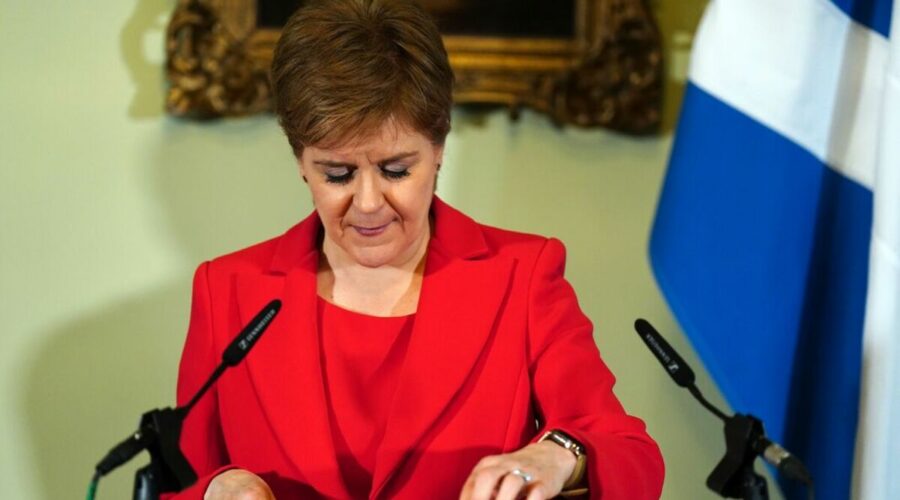EU told to view Nicola Sturgeon’s failed indyref dream as warning
Nicola Sturgeon’s resignation celebrated by Scots in Glasgow
We use your sign-up to provide content in ways you’ve consented to and to improve our understanding of you. This may include adverts from us and 3rd parties based on our understanding. You can unsubscribe at any time. More info
Scotland’s independence movement stood at a crossroads last night, as Unionist parties considered how Nicola Sturgeon’s snap resignation may transform the UK’s political landscape at the next general election. Ms Sturgeon shocked Holyrood on Wednesday after she told a hastily arranged press conference she was to quit.
“With Nicola Sturgeon, so goes Scottish independence, the last of Europe’s great independence movements,” analysts at Eurointelligence claimed as they heard the news.
They continued: “Sturgeon’s successor will try to keep the torch lit. But the momentum for Scottish independence has been fading for some time. Sturgeon left in part because she knew that she would not achieve her greatest goal.”
But they see Sturgeon’s failure as “part of a broader European phenomenon”.
They argued: “We have been arguing consistently that the idea of regional independence with the EU is a non-starter, and that the EU should not encourage it.


“Spain would have vetoed Catalonia’s accession. It never made sense for Scotland to open its non-existent borders with the EU’s single market, while erecting an external EU border – for immigration and customs – in the middle of the UK.
“The irony is that the EU makes independence feasible on one level, yet impossible on another.”
Sturgeon insisted recent political challenges, such as the UK Government’s decision to halt its gender recognition reforms, had not influenced the decision.
The Labour Party mulled over the opportunity Ms Sturgeon’s departure could present it at the next UK-wide election, as winning Scottish constituencies could tip the balance further in its favour at Westminster.
READ MORE: ‘We haven’t forgotten about the Middle-East’ says British Army Colonel
Scottish Labour leader Anas Sarwar suggested there was now a belief in Scotland that a UK Labour Government was possible for the first time since the party lost power in 2010.
At the same time, he said it would require the party to make “significant gains” in Scotland at the next general election – expected in a little over 12 months – for that to happen.
He told BBC: “For 12 years I don’t think people in Scotland have believed that a Labour UK government was possible. I think that is changing now. I think people believe a UK Labour government is possible.”
Labour’s long-standing stranglehold on Scotland in Westminster elections came to an abrupt end in 2015 when it was all but wiped out in an SNP landslide.
DON’T MISS:
Massive 6.1 magnitude earthquake hits New Zealand [INSIGHT]
The spy balloon scientist pulling the strings in China [ANALYSIS]
Brexit Britain outclassed by French military despite spending more [DATA]
Ms Sturgeon’s exit comes at a fortuitous time for Labour, which is due to hold its party conference this coming weekend.
The Scottish Tories meanwhile had no warm words for the departing First Minister, with the party leader Douglas Ross insisting Ms Sturgeon had “presided over a decade of division and decay in Scotland”.
Mr Ross also rubbished claims that Labour could win across Scotland at the next general election.
The Conservatives at Westminster tried to strike a more cordial tone, with Prime Minister Rishi Sunak paying tribute to Ms Sturgeon’s “long-standing service”.
But his Scottish Secretary, Alister Jack, said her resignation was “a welcome opportunity for the Scottish Government to change course, and to drop its divisive obsession with independence”.
The SNP, which Ms Sturgeon has led for eight years, will meet soon to discuss a timetable for the election of a new leader.
Source: Read Full Article

